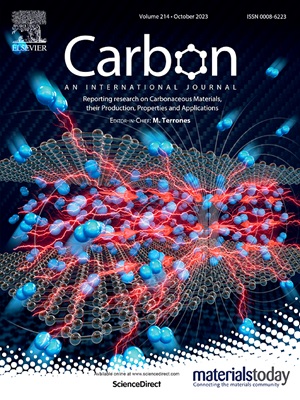Flash-Joule-heating enhancing electromagnetic absorption performance of cobalt polyphthalocyanine complex derived 2D Co/C nanocomposite
IF 10.5
2区 材料科学
Q1 CHEMISTRY, PHYSICAL
引用次数: 0
Abstract
Conventional carbonization methodologies employed in the synthesis of carbon-based nanocomposites are frequently compromised by structural imperfections, which substantially diminish electromagnetic wave attenuation capabilities. To address this limitation, we herein propose a Flash-Joule-Heating (FJH) treatment strategy for microstructural refinement of 2D Co/C nanocomposite. After FJH treatment, it is revealed that the graphitization, structural ordering, and crystallinity improve remarkably. The obtained Co/C nanocomposite shows apparently enhanced electromagnetic waves absorption (EMA), where the effective absorption bandwidth broadens from 5 GHz to 6.12 GHz (a 22.4 % increase), compared to the untreated sample. The enhancing mechanism is predominantly attributed to the rebalancing of dielectric loss and a transition in the magnetic loss mechanism. This work demonstrates an effective treatment strategy for improving the microstructure and electromagnetic response of carbon-based nanocomposite, offering valuable insights into the design of high-performance EMA materials.

闪现焦耳加热增强聚酞菁钴络合物衍生的二维Co/C纳米复合材料的电磁吸收性能
在碳基纳米复合材料的合成中,传统的碳化方法经常受到结构缺陷的影响,这大大降低了电磁波的衰减能力。为了解决这一限制,我们提出了一种闪光焦耳加热(FJH)处理策略来细化二维Co/C纳米复合材料的微观结构。经FJH处理后,石墨化程度、结构有序度和结晶度均有明显改善。所得Co/C纳米复合材料的电磁波吸收(EMA)明显增强,有效吸收带宽从5 GHz增加到6.12 GHz,比未处理的样品增加22.4%。这种增强机制主要归因于介质损耗的再平衡和磁损耗机制的转变。本研究为改善碳基纳米复合材料的微观结构和电磁响应提供了一种有效的处理策略,为高性能电磁材料的设计提供了有价值的见解。
本文章由计算机程序翻译,如有差异,请以英文原文为准。
求助全文
约1分钟内获得全文
求助全文
来源期刊

Carbon
工程技术-材料科学:综合
CiteScore
20.80
自引率
7.30%
发文量
0
审稿时长
23 days
期刊介绍:
The journal Carbon is an international multidisciplinary forum for communicating scientific advances in the field of carbon materials. It reports new findings related to the formation, structure, properties, behaviors, and technological applications of carbons. Carbons are a broad class of ordered or disordered solid phases composed primarily of elemental carbon, including but not limited to carbon black, carbon fibers and filaments, carbon nanotubes, diamond and diamond-like carbon, fullerenes, glassy carbon, graphite, graphene, graphene-oxide, porous carbons, pyrolytic carbon, and other sp2 and non-sp2 hybridized carbon systems. Carbon is the companion title to the open access journal Carbon Trends. Relevant application areas for carbon materials include biology and medicine, catalysis, electronic, optoelectronic, spintronic, high-frequency, and photonic devices, energy storage and conversion systems, environmental applications and water treatment, smart materials and systems, and structural and thermal applications.
 求助内容:
求助内容: 应助结果提醒方式:
应助结果提醒方式:


